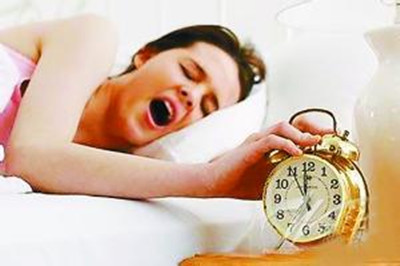Don't forget to move your clocks forward this weekend.
這個(gè)周末不要忘記調(diào)整你的鬧鐘。
And then don't forget to be more careful in the days after you adjust your clocks.
之后也不要忘記要小心謹(jǐn)慎些。
Because a recent study found that the hour of lost sleep was related to increased job-related injuries.
因?yàn)樽罱豁?xiàng)研究表明睡眠時(shí)間的損失和工傷事故的增加有關(guān)系。
Probably because sleepy workers were less alert.
或許是出于昏昏欲睡的工人們警惕性不高的緣故。
The work appeared in the Journal of Applied Psychology.
這項(xiàng)研究工作已在《應(yīng)用心理學(xué)》雜志上發(fā)表。

Organizational behavioral psychologists Christopher Barnes and David Wagner analyzed reports filed with the National Institute for Occupational Safety and Health about injuries that took place in mines.
組織行為學(xué)心理學(xué)家克里斯托弗·貝納斯和大衛(wèi)·瓦格納分析了在國(guó)家職業(yè)安全與健康研究所中存放的一些關(guān)于煤礦事故的檔案。
The study looked at all reports between 1983 and 2006.
他們選取了1983到2006年間的一些事故調(diào)查報(bào)告。
And they found that compared with other days, more injuries happened on the Monday after daylight saving time went into effect.
他們發(fā)現(xiàn)與平常日子相比較,夏令時(shí)開始后的每周一工作日事故發(fā)生的頻率更高。
And the injuries were more severe.
而且人員傷亡也較嚴(yán)重。
Survey data found that people sleep on average 40 minutes less on the Sunday night right after the time change.
調(diào)查數(shù)據(jù)發(fā)現(xiàn)周日夜晚剛好在時(shí)間變更后人們的睡眠時(shí)間比平均少了40分鐘。
The data also revealed that on Mondays after the switch to standard time,when we gain an hour of sleep,there's no significant differences in sleep or injuries.
該數(shù)據(jù)也顯示出在周一調(diào)整成標(biāo)準(zhǔn)時(shí)間后,當(dāng)我們多了一小時(shí)的睡眠時(shí)間,睡眠和受傷之間的關(guān)系也并沒顯示出什么特別重要的差異改變。
So enjoy that extra hour of sunlight in the evening. Carefully.
所以盡情享受晚上多出來的這一小時(shí)時(shí)光吧。小心為上。












